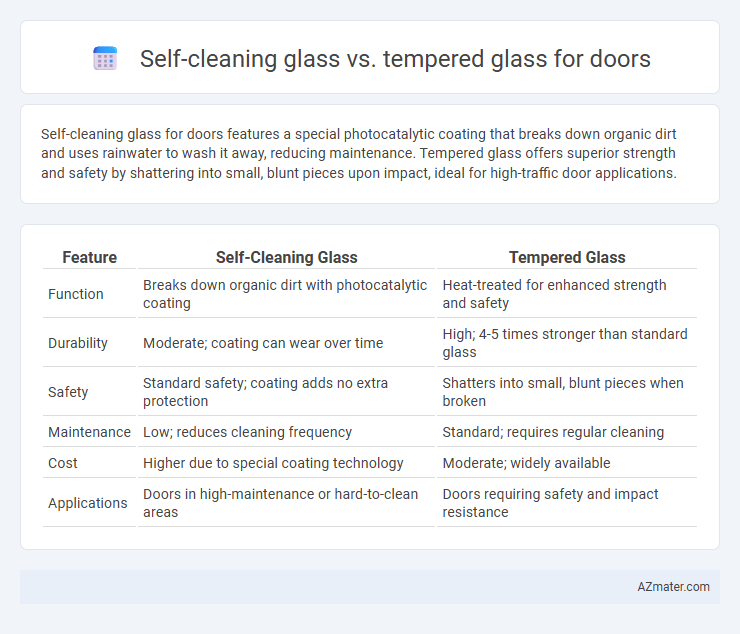Self-cleaning glass for doors features a special photocatalytic coating that breaks down organic dirt and uses rainwater to wash it away, reducing maintenance. Tempered glass offers superior strength and safety by shattering into small, blunt pieces upon impact, ideal for high-traffic door applications.
Table of Comparison
| Feature | Self-Cleaning Glass | Tempered Glass |
|---|---|---|
| Function | Breaks down organic dirt with photocatalytic coating | Heat-treated for enhanced strength and safety |
| Durability | Moderate; coating can wear over time | High; 4-5 times stronger than standard glass |
| Safety | Standard safety; coating adds no extra protection | Shatters into small, blunt pieces when broken |
| Maintenance | Low; reduces cleaning frequency | Standard; requires regular cleaning |
| Cost | Higher due to special coating technology | Moderate; widely available |
| Applications | Doors in high-maintenance or hard-to-clean areas | Doors requiring safety and impact resistance |
Introduction to Self-Cleaning and Tempered Glass
Self-cleaning glass utilizes a special coating that breaks down organic dirt through photocatalysis and allows rainwater to wash it away, reducing maintenance for door applications. Tempered glass is heat-treated to increase strength and durability, providing enhanced safety by shattering into small, blunt pieces instead of sharp shards upon impact. Both types are essential for modern door designs, with self-cleaning glass emphasizing low maintenance and tempered glass focusing on safety and structural integrity.
How Self-Cleaning Glass Works
Self-cleaning glass features a special titanium dioxide coating that activates under sunlight to break down organic dirt through a photocatalytic process. This coating also creates a hydrophilic surface, allowing rainwater to spread evenly and wash away loosened grime, reducing the need for manual cleaning. In contrast, tempered glass prioritizes strength and safety by undergoing controlled thermal treatments, but lacks the dirt-repellent and cleaning properties inherent to self-cleaning glass.
The Science Behind Tempered Glass
Tempered glass for doors is engineered through a controlled thermal or chemical treatment that increases its strength by introducing compressive stresses on the surface and tensile stresses in the center, making it up to five times stronger than regular glass. This process ensures that upon impact, tempered glass shatters into small, blunt pieces instead of sharp shards, enhancing safety in door applications. Unlike self-cleaning glass, which relies on photocatalytic and hydrophilic coatings to minimize dirt adhesion, tempered glass prioritizes mechanical durability and impact resistance through its unique molecular structure.
Key Benefits of Self-Cleaning Glass Doors
Self-cleaning glass doors significantly reduce maintenance by utilizing a special photocatalytic and hydrophilic coating that breaks down organic dirt and allows water to spread evenly, washing away grime effortlessly. This technology ensures clearer visibility and prolonged aesthetic appeal compared to tempered glass doors, which primarily offer enhanced strength and safety but require regular cleaning. The key benefits of self-cleaning glass doors include reduced cleaning frequency, improved durability against weathering, and enhanced energy efficiency through better light transmission.
Main Advantages of Tempered Glass Doors
Tempered glass doors offer superior strength and safety, as they are heat-treated to withstand impact and thermal stress, reducing the risk of breakage. Their shatter-resistant properties ensure that if broken, the glass crumbles into small, blunt pieces, minimizing injury. These doors also provide enhanced durability and resistance to temperature changes, making them ideal for high-traffic and exterior door applications.
Durability Comparison: Self-Cleaning vs Tempered Glass
Tempered glass offers superior durability with high resistance to impact and thermal stress, making it ideal for door applications requiring enhanced safety. Self-cleaning glass, often coated with a photocatalytic layer, provides moderate durability but can be more susceptible to scratches and surface damage compared to tempered options. For long-term performance in doors, tempered glass outperforms self-cleaning glass in terms of strength and impact resistance, while self-cleaning glass focuses on ease of maintenance rather than maximum durability.
Maintenance and Cleaning Requirements
Self-cleaning glass requires minimal maintenance due to its photocatalytic and hydrophilic coatings that break down organic dirt and allow water to spread evenly, reducing manual cleaning frequency. Tempered glass, while highly durable and resistant to impacts, demands regular cleaning with standard glass cleaners to maintain clarity and hygiene. Choosing self-cleaning glass for doors significantly lowers long-term upkeep costs and labor compared to traditional tempered glass.
Cost Analysis and Lifespan
Self-cleaning glass typically costs 20-40% more than tempered glass due to its specialized coating that reduces maintenance expenses by minimizing cleaning frequency. Tempered glass offers a longer lifespan averaging 25-30 years, while self-cleaning glass, depending on environmental exposure, generally lasts around 15-20 years before the coating degrades. The cost analysis favors tempered glass for budget-conscious projects, whereas self-cleaning glass delivers long-term savings in cleaning labor and chemical costs despite its higher initial price.
Safety and Security Considerations
Self-cleaning glass for doors features a special nano-coating that breaks down organic dirt and repels water, reducing maintenance but offering moderate impact resistance. Tempered glass, engineered through controlled thermal treatment, provides superior strength and shatters into small, blunt pieces upon breakage, significantly enhancing safety by minimizing injury risk. For security, tempered glass is preferred due to its higher resistance to impact and forced entry compared to the more fragile self-cleaning glass surfaces.
Which Glass Type Is Best for Your Door?
Self-cleaning glass features a special coating that breaks down organic dirt and uses rainwater to wash it away, reducing maintenance and keeping doors clear. Tempered glass offers enhanced strength and safety, shattering into small, blunt pieces when broken, making it ideal for high-impact or security-conscious areas. Choosing the best glass for your door depends on whether ease of maintenance or maximum safety is your priority.

Infographic: Self-cleaning glass vs Tempered glass for Door
 azmater.com
azmater.com